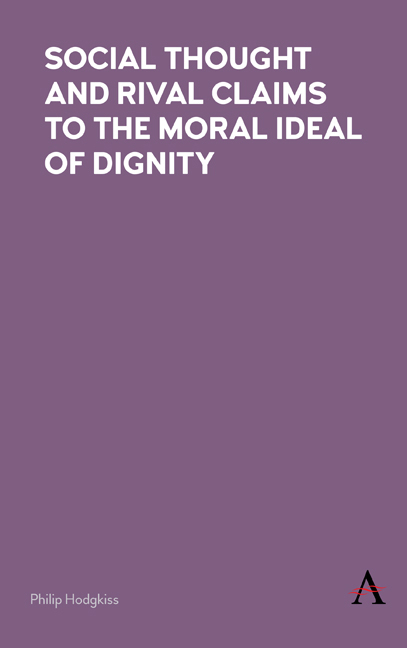Book contents
- Frontmatter
- Contents
- Preface and Note on Text Structure
- Acknowledgements
- Chapter One Introduction: The Distinction of Dignity
- Chapter Two Dignity, Freedom and Reason: From Ancient Greece to Early Modernity
- Chapter Three The Sense of Dignity in Moral Philosophy: From the Ethical Intuitionists to the Irrationalists
- Chapter Four Marx's Critique of Morality: Natural Law, the State and Citizenship
- Chapter Five Classical Sociology's Regard for Human Dignity
- Chapter Six The Human Face of Dignity Reflected in Phenomenology and Existentialism
- Chapter Seven A Fresh Term for Dignity: Attending the Frankfurt School (Both ‘Old’ and ‘Young’)
- Chapter Eight Notes Sampling Research and Practice: Making Dignity Work; Making Dignity Care
- Chapter Nine The Slighting of Dignity: The Critic's Charter
- Chapter Ten Conclusion: After the Recognition of Dignity
- Notes
- Bibliography
- Index
Chapter Three - The Sense of Dignity in Moral Philosophy: From the Ethical Intuitionists to the Irrationalists
Published online by Cambridge University Press: 21 June 2018
- Frontmatter
- Contents
- Preface and Note on Text Structure
- Acknowledgements
- Chapter One Introduction: The Distinction of Dignity
- Chapter Two Dignity, Freedom and Reason: From Ancient Greece to Early Modernity
- Chapter Three The Sense of Dignity in Moral Philosophy: From the Ethical Intuitionists to the Irrationalists
- Chapter Four Marx's Critique of Morality: Natural Law, the State and Citizenship
- Chapter Five Classical Sociology's Regard for Human Dignity
- Chapter Six The Human Face of Dignity Reflected in Phenomenology and Existentialism
- Chapter Seven A Fresh Term for Dignity: Attending the Frankfurt School (Both ‘Old’ and ‘Young’)
- Chapter Eight Notes Sampling Research and Practice: Making Dignity Work; Making Dignity Care
- Chapter Nine The Slighting of Dignity: The Critic's Charter
- Chapter Ten Conclusion: After the Recognition of Dignity
- Notes
- Bibliography
- Index
Summary
The search for an ethical system and a first principle thereof, which would have practical influence and would actually transform and improve the human race, is just like the search for the philosophers’ stone. (Schopenhauer 1969, 527)
Moral Sense: Sympathy, Pity and Compassion as Counterparts to Dignity
For our purpose, a significant legacy from the period of philosophy considered in the previous chapter is this: while for Descartes, ‘mental (or cognitive) intuition’, seen as something ‘inward’, had a primary role to play in the acquisition of knowledge, registering the ‘outward’ influence of sensation seemed to be beyond him. Locke noted that the ‘clear light’ of intuitive knowledge was ‘irresistible and, like bright sunshine, forces itself immediately to be perceived, as soon as ever the mind turns its view that way’ (Locke 1977, 272). It should be noted, too, that in Spinoza's schema of knowledge, the highest grade of adequate ideas was ‘intuitive rational insight’. However, all this was a far cry from the application of intuition to the perception of moral values and ethical standards and from the rehabilitation of emotion. Nevertheless, from the end of the seventeenth century through the first three decades of the eighteenth century, the so- called ethical intuitionists (see Hudson 1967) held that ordinary human beings have an immediate awareness of moral values. Some adherents to this position, such as Shaftesbury and Francis Hutcheson, conceived it as a form of sense perception, while others, for example, Cudworth and Clarke, held that it is reason or understanding that provides such ethical awareness. Joseph Butler, while critical, appeared to see some virtue in both positions. What emerged is a recognition that over time, the individual moral subject had developed the capacity for fellow- feeling, not just for others as moral subjects but for others as fellow human beings. While Adam Ferguson emphasized love and compassion, Hutcheson (following Shaftesbury, to some extent) envisaged a moral sense, akin to our sense of beauty, that enables us to discern moral worth, the experience of which we find rewarding in itself. He held that further to our five senses, we have a moral sense alongside a sense of beauty. We are pleased by something beautiful, as we are by virtuous conduct (any instruction in these areas being predicated on the existence of these senses).
- Type
- Chapter
- Information
- Publisher: Anthem PressPrint publication year: 2018

